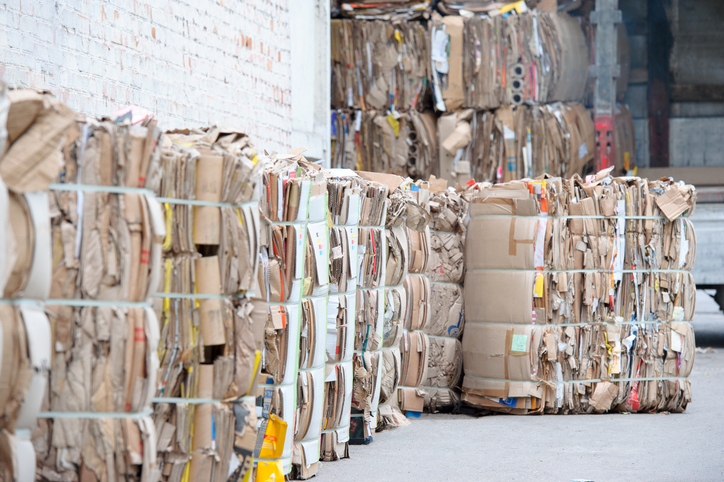What’s the goal of commercial recycling? Sustainability is important, but for businesses and other large organizations, there are generally two core motivators behind managing recyclables: getting recyclable waste out of your facility as easily and cheaply as possible, and maintaining compliance with any relevant laws. (Here in Massachusetts, large organizations must tread carefully around MassDEP’s waste bans or risk potential fines.) Designing an efficient commercial recycling program can help a large organization meet its recycling goals, with minimal daily oversight required.
Commercial Recycling in Massachusetts: Things Large Organizations Need for an Effective Program
Cost efficiency. There are a few things that organizations can do to run their commercial recycling programs cost efficiently. The first is making sure that all valuable recyclables are being collected correctly. Any scrap metal that is thrown away instead of recycled, or is neglected outdoors and allowed to rust, is a missed opportunity to get top dollar for that material. Your recycling service can provide guidance about the best way to collect and sort valuable recyclables like scrap metal and paper.
The other piece is minimizing your overall costs for commercial recycling services. This really comes down to customizing your in-house recycling procedures and pickup schedule so you’re not paying for more services than you need.
Adequate storage and equipment solutions. There’s a careful balance that needs to be struck in a large organization’s commercial recycling process. You need to have enough containers and equipment to hold all your various types of recyclable waste, but not so many that they take over half the warehouse or cost you a lot of money to set up. Getting the right equipment on-site is something that really requires a walk-through with your recycling service. We can come into an organization to assess every element of its recycling program and make recommendations about equipment and procedures. Sometimes bringing in balers, compactors or other types of equipment can actually help a business save space and money.
Employee buy-in. Getting everyone in the organization to comply with a set of recycling rules can be difficult for a variety of reasons. It’s the organization’s responsibility to enforce its commercial recycling policies. This can be achieved by providing adequate collection storage, creating eye-catching signs that clearly indicate what materials belong in which containers, and refreshing employee training whenever mistakes are made. Ideally, everyone on-site should find it so easy to recycle things that there’s no reason for recyclable materials to end up in the trash or in the wrong container.
Strategies for managing organic waste and other hard-to-manage waste.
Managing organic waste is a concern for all large Massachusetts businesses because of MassDEP’s organic waste ban. The ban applies to any organization that generates more than one-half ton of organic waste per week. Even if your organization rarely generates that much organic waste, the ban applies during any week in which it does. So, if you host a big company event and have a lot of food waste left over, or generate a lot of yard waste one day while doing a landscaping project, you must have a strategy in place to dispose of it correctly. Organic waste must be diverted to recycling, composting, conversion or reuse, per MassDEP. Your recycling service can advise about handling organic and hard-to-manage waste.
Strategies for complying with Massachusetts commercial recycling laws.
In addition to the organic waste ban, Massachusetts organizations are subject to some other local recycling laws. MassDEP’s textile and mattress bans may affect some businesses. Mattresses must be donated or handed off to mattress recyclers. Textiles can be shredded but can’t be thrown away with other trash bound for landfills. All organizations in the Commonwealth should also be aware that tires, construction materials and demolition materials can’t be accepted by Massachusetts landfills.
As for recycling electronic waste, the only thing MassDEP currently requires is that outdated cathode ray tube TVs are recycled in a particular way. Other e-waste could technically be thrown away without violating any Massachusetts recycling laws—but for data security purposes alone, organizations should always arrange for hard drives and other data-storing devices to be shredded at the end of their useful life. (Our sister company, Northeast Data Destruction, can help businesses that need shredding services in Massachusetts.)
Need Commercial Recycling Services in Massachusetts?
Miller Recycling has been providing commercial recycling services to Massachusetts organizations for decades. If all you need is a reliable recycling service that can come collect your materials on a set schedule, we can do that. But if you need different recycling equipment, or want help improving your recycling program, or guidance about how to get the best return on your valuable recyclables, we can do that too. Getting all the right pieces in place now allows your commercial recycling program to run like a well-oiled machine.
I’m happy to answer any questions you might have about how Miller Recycling can help your specific Massachusetts organization—contact me today!


